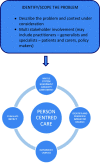Generalist solutions to complex problems: generating practice-based evidence--the example of managing multi-morbidity
- PMID: 23919296
- PMCID: PMC3750615
- DOI: 10.1186/1471-2296-14-112
Generalist solutions to complex problems: generating practice-based evidence--the example of managing multi-morbidity
Abstract
Background: A growing proportion of people are living with long term conditions. The majority have more than one. Dealing with multi-morbidity is a complex problem for health systems: for those designing and implementing healthcare as well as for those providing the evidence informing practice. Yet the concept of multi-morbidity (the presence of >2 diseases) is a product of the design of health care systems which define health care need on the basis of disease status. So does the solution lie in an alternative model of healthcare?
Discussion: Strengthening generalist practice has been proposed as part of the solution to tackling multi-morbidity. Generalism is a professional philosophy of practice, deeply known to many practitioners, and described as expertise in whole person medicine. But generalism lacks the evidence base needed by policy makers and planners to support service redesign. The challenge is to fill this practice-research gap in order to critically explore if and when generalist care offers a robust alternative to management of this complex problem. We need practice-based evidence to fill this gap. By recognising generalist practice as a 'complex intervention' (intervening in a complex system), we outline an approach to evaluate impact using action-research principles. We highlight the implications for those who both commission and undertake research in order to tackle this problem.
Summary: Answers to the complex problem of multi-morbidity won't come from doing more of the same. We need to change systems of care, and so the systems for generating evidence to support that care. This paper contributes to that work through outlining a process for generating practice-based evidence of generalist solutions to the complex problem of person-centred care for people with multi-morbidity.
Figures
References
-
- Royal College of General Practitioners. Medical Generalism. Why expertise in whole person medicine matters. London: College of General Practitioners; 2012.
-
- Royal College of Physicians and Surgeons of Canada. Generalism: achieving a balance with specialization. http://www.royalcollege.ca/portal/page/portal/rc/common/documents/educat....
-
- Committee of Quality in Health Care in America, Institute of Medicine. Crossing the quality chasm: a new health system for the twenty first century. Washington DC: National Academies Press; 2001.
MeSH terms
Grants and funding
LinkOut - more resources
Full Text Sources
Other Literature Sources
Miscellaneous



